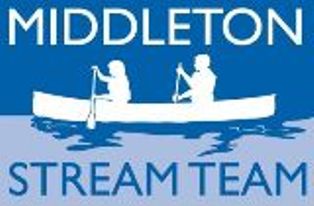THE WATER CLOSET
DON’T SPRAY OUR WATERS, AIR AND SOIL
Sixty years ago, the late naturalist-writer Rachel Carson warned us about spraying manmade chemicals. In last Friday’s Tri-Town Transcript, Boxford Trails Association/Boxford Land Trust (BTA/BOLT) president, Natasha Griggs, defended her group’s NO SPRAYING signs1being put up throughout the area by homeowners not wanting the towns to spray along our roads for mosquitoes.

A BTA/BOLT’s sign instructing town’s mosquito spray trucks to turn off their nozzles while passing. Which organisms of tens of thousands are affected? Does anyone know?
Judy Schneider photo
Now people of the world are much worried about honeybees featured on BTA/BOLT’s signs. They are diminishing in number and we don’t know why. Everyone knows what bees do and their importance. They pollinate plants including many that feed us. Do our insecticides affect them? The warning labels of many say they do. Nionicotinoids, a relatively new group of synthetic insecticides, are alleged to do so. The European Union has banned their use for two years. The United States has not as yet.
In Grigg’s straight forward letter she closes with:
“Boxford prides itself on its open spaces, clean water and air. To panic and poison the environment and allow ourselves and allow our land to be sprayed and to couch all this in “scientific verbiage”, the message having been crafted by manufacturers of these poisons, I believe it is foolhardy at best and has long, negative consequences for all living things.”
How Rachel would applaud her words if alive to hear them. In her famous book, Silent Spring, warning the world about manmade pesticides, especially her fellow Americans, she told us we didn’t realize the harm we were doing. She, much maligned by many with vested interests at the time, has been proven right over and over ever since. Thousands of laws have since been passed across the country to protect air, water and soil from manmade chemicals whose safety has only been partially tested. The Federal Clean Air and Clean Water Acts of the early 1970s can be directly traced back to Silent Spring.
If you haven’t read scientist Carson’s book we recommend it. She was angry at the manufacturers of the “poisons” and at government agriculture departments that gave them their blessings. She did little to disguise her rage. Those upset by Carson called her many names; one phrase was “hysterical woman.” However, they were unable to refute her evidence that harm was being done to other than target organisms. She, an honest zoologist who had done her homework, knew more than they did. One of her accusations was that the chemical/agricultural lobby also knew but weren’t admitting. We are reminded of the tobacco industry and its crooked defense.
And speaking of defense, there are millions of animals in the world besides us that need protecting. We have learned through Darwin, Carson and thousands of others that we are interconnected through time and chemistry. We share lots of the same DNA and proteins. When our brilliant chemists make new molecules, there are many tens-of-thousands; it must be understood they have not come about through evolution. They are not ones that organisms have adapted to. On a molecular level when the newcomers from the labs and factories are released, it is like “throwing wrenches in the works”. In most cases we don’t know what they do to an organism’s biochemical machinery. There are thousands of insects, birds and worms out there besides mosquitoes that like us have not been tested for the novel chemical’s effects. Those organisms are important in the natural webs we are a part of. All living things in those webs are dependent upon water, not just that in ponds and streams but in the ground water as well. Spraying poisons the water to some degree.
While pondering the spraying of habitats to get target insects that might be carrying deadly viruses that might kill or sicken one in one hundred thousands of our species, someone remembered Aldo Leopold’s chapter on wilderness in his famous book A Sand County Almanac. In it, he has a section on ethics as it relates to the environment. “There is yet no ethic dealing with man’s relationship to the land and to the animals and plants that grow upon it.” Leopold saw an ethic coming, one that he later was given much credit for. Alas, he died in 1948 at the age of 61. How we wish that wonderful naturalist and writer had read Carson’s books and had known her. Between them the ethic had arrived.
In the same section Leopold tells what the land ethic he wants would include, not as private property, but as society’s responsibility. “The land ethic simply enlarges the boundaries of the community to include soils, waters, plants, and animals, or collectively the land.” Greenbelt, BTA/BOLT, Middleton Stream Team, Ipswich River Watershed Association and thousands of other environmental groups throughout the world believe this deeply.
People should certainly know3what they might be doing before they add chemicals to the habitats of millions of species.
1 Signs may be purchased for $5 from BTA/BOLT, Essex County Beekeepers Association, and the Essex County COOP.
2 “The Plight of the Honeybee”, an article in the May 10, 2013 National Geographic News, is about the possible causes of the worldwide colony collapse disorder afflicting bees.
3 Manmade industrial chemicals, medicines, fungicides, herbicides, and insecticides are tested but only to certain degrees and only for their effects on certain species. There are many thousands of manmade chemicals and millions of species. Another great worry is the synergistic affect when two or more chemicals are used. One plus one may equal many more than two in affect. Synergistic relationships between pesticides and organisms are poorly understood.
—————————————————————————————————————-
THE WATER CLOSET is provided by the Middleton Stream Team: www.middletonstreamteam.org or <MSTMiddletonMA@gmail.com>
